Famous People Who Threw In the Towel
Nobody likes a quitter, folks used to say. But lately it’s become almost fashionable to quit. Kids quit school and go pro — or go online — and get famous. Famous athletes and TV stars retire at the height of fame, and are hailed for their courage.Our love/hate relationship with quitting comes from a gut feeling that it must feel good to just chuck it in, while knowing that it feels good to stick it out, too. Here are a few who didn’t quite stick it out.
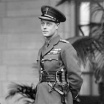
KING EDWARD VIII may be the most famous quitter of them all. In 1936, when Edward had been on the throne of England for a year, he embarrassed the royal family by going ga-ga over an American divorceé, Wallis Simpson. Rather than give up his relationship with Simpson, Edward gave up his throne and married her. Edward’s younger brother took over as King George VI, and Edward and Wallis spent the rest of their lives in exile.
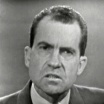
The 37th President of the United States, RICHARD NIXON, was a quitter twice over. After he lost a presidential election in 1960 and a gubernatiorial election in 1962, Nixon declared he was through with politics. He went on to become a twice-elected president anyway, only to be forced by the Watergate scandal to quit in 1974.
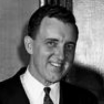
U.S. Senator EDMUND MUSKIE ran against Richard Nixon in the presidential election of 1972, and had a good chance at the Democratic nomination. But Muskie dropped out during the primary elections. In an outdoor press meeting, it was thought that Muskie had wept while defending his wife, and the fallout forced him to quit the race.

Alaska Governor SARAH PALIN got a rocket ride to national fame in 2008, when John McCain chose her as his presidential running mate. They lost the election that November, and eight months later she quit her job as governor, too. Palin said she had decided not to run for reelection in 2010 and didn’t want to be a lame duck. Instead, she announced, she would step down right away — which she did, on 26 July 2009, handing the job over to Lt. Governor Sean Parnell.
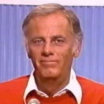
MCLEAN STEVENSON played Henry Blake, the bumbling camp commander in the TV sitcom M*A*S*H. The show launched in 1972 and was a huge hit. But despite the show’s popularity, Stevenson went AWOL in 1975, hoping to be a big star on a rival network. It didn’t happen. But it was too late to go back: M*A*S*H killed Henry Blake in a plane crash and replaced him with a new commander, Col. Potter, played by veteran actor Harry Morgan.
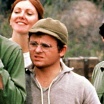
GARY BURGHOFF was another M*A*S*H regular who quit the show while it was still a hit. Gary played “Radar” O’Reilly, the company clerk and one-time aide to McLean Stevenson’s character. Something must have rubbed off — Burghoff left the show in 1979, but his later career results were even less sterling than Stevenson’s.
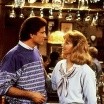
An alumnus of the famed comedy troupe Second City, SHELLEY LONG starred in the hit sitcom Cheers during the 1980s. She played barmaid Diane Chambers, and her opposites-attract love affair with bartender Sam Malone (Ted Danson) was one of the highlights of the series. In spite of the popularity of the show and her character, Long quit the show in 1987 to jump into a career in the movies. Although she never became an A-list movie star, Long continued to pop up on Cheers and its spinoff, Frasier.
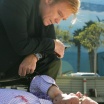
DAVID CARUSO didn’t even have the multi-season patience of McLean Stevenson or Shelley Long. The red-headed star of he hit cop show NYPD Blue lasted for a little more than one season before jumping ship in 1994. His much-publicized bid for big-screen stardom fell flat with movies like Kiss of Death and Jade (both 1995). But Caruso made a comeback in 2002, beginning a long run as a detective on TV’s CSI: Miami.
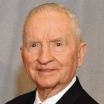
In 1992 ROSS PEROT ran against the Democrats and the Republicans for the presidency, using his own dough and an energetic grassroots organization. In the middle of the summer’s primaries, Perot suddenly quit.
A few weeks later — before the election — he tossed his hat back into the ring again and ended up with 19% of the popular vote. That 19% was widely credited with beating the incumbent, George Bush the elder, and giving the win to Democrat Bill Clinton.
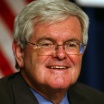
NEWT GINGRICH was the hero of the Republican party after the 1994 elections, credited with engineering a long hoped-for Republican majority in the U.S. House of Representatives. Only four years later, he was the goat. Disappointment over the 1998 election spurred Gingrich to gather up his pens and notebooks and go home. He resigned as Speaker of the House and left Congress in 1999.

The Spice Girls took the world of 1990s pop music by storm with singles like “Wannabe” and “Say You’ll Be There” and funny names like Posh Spice and Sporty Spice. They even made a movie, Spice World, in 1997. Then in 1998 Ginger Spice, a.k.a. GERI HALLIWELL, suddenly quit. She later said it was because of a conflict with her charitable work for breast cancer, but she went on to quite a successful career on her own. She also reunited with the Spice Girls in 2007 for a world tour and a new round of fame.

After years of great reviews and TV’s highest ratings, JERRY SEINFELD declared his intention to retire from his legendary sitcom, Seinfeld, while he was still on top of his game. Despite offers of millions of dollars to do at least one more season, he walked away from the show in 1998 to pursue what appeared to be a career in television commercials. Later he returned to standup comedy and starred in the 2007 animated film Bee Movie.
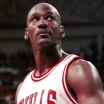
Often called the “best basketball player ever,” MICHAEL JORDAN has the I’m-quitting-wink-wink reputation of Richard Nixon and the quit-while-you’re-ahead style of Jerry Seinfeld. Jordan abruptly retired from basketball in 1993 to pursue a baseball career. He returned to basketball in 1995, but retired again in 1998, after leading the Chicago Bulls to a total of six championships. After a stint in the front office of the Washington Wizards, Jordan un-retired again, announcing on 25 September 2001 that he would suit up and play for the Wizards in the 2001-02 NBA season. Jordan retired again — possibly for good — after the 2002-03 season.
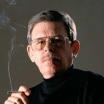
Radio host ART BELL started his nationally syndicated talk show in 1993. Year after year, night after night, Bell and his guests discussed UFOs, witches, crop circles, government conspiracies, ghosts and all manner of strange subjects. In October of 1998, Bell suddenly announced that he was leaving broadcasting for good, effective immediately.
The reasons were veiled in mystery. Was he abducted? Did the government finally silence him? Two weeks later he returned to the air without explanation.
Then in April of 2000, Bell again announced that he was retiring from broadcasting altogether, dogged by false accusations and preoccupied with a family tragedy. But in 2001 Bell went back on the air with his syndicated program, Coast to Coast. Bell retired again at the end of 2002, giving way to new host George Noory, but the indefatigable Bell returned again late in 2003 to serve as weekend host of Coast to Coast. After a topsy-turvy 2006 — his wife died, he remarried, he did his broadcasts for a while from the Philippines — Art announced in July of 2007 that he was retiring to spend time with his new wife and their baby daughter.

The popular TV talent show American Idol spawned several overnight sensations, from 2002 winner Kelly Clarkson to enthusiastically off-key charmer William Hung. The chance for a recording contract and national exposure put stars in the eyes of young singers across the United States, including New York’s MARIO VAZQUEZ. Early on in the 2005 season Mario seemed to have the edge, either as “the cute one” or “the one with the hat.” But a mere eight weeks into the competition, after making the final round of 12 contestants, Vazquez suddenly quit the show, citing undisclosed “family reasons.” He later got a recording contract and released an album, Mario Vazquez, in 2006.
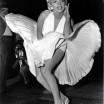
Of course, some people just won’t quit — even after death.
See who we mean in SUPPOSED TO BE GHOSTS >>
